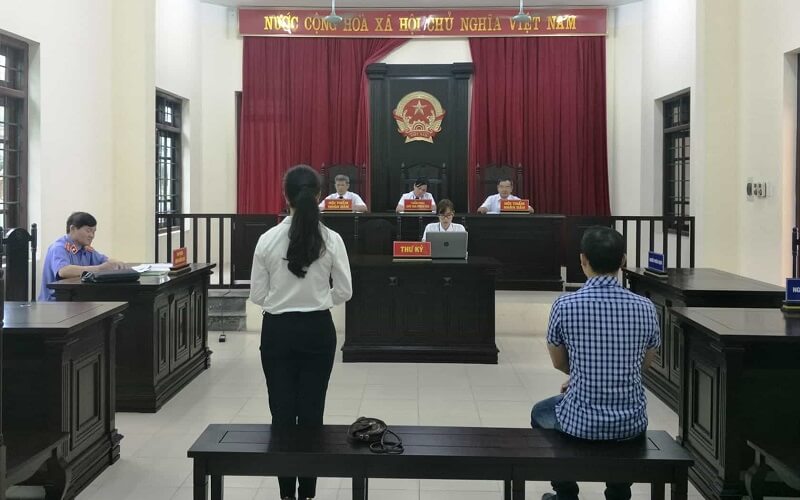When a couple is living together unhappily and constant disputes lead to a decision to divorce, it is important to understand the divorce procedures and what documents are required by the court. Here is a comprehensive guide to help you navigate the divorce process in 2022.
1. What is the divorce procedure?
 Divorce procedure involves a mandatory set of documents and procedures to legally end a marriage.
Divorce procedure involves a mandatory set of documents and procedures to legally end a marriage.
The divorce procedure encompasses the necessary documents and legal processes to terminate a marriage, as outlined by Vietnamese law. It is a means to officially sever the marital relationship, initiated by either the husband or the wife, and recognized by the court.
Prior to initiating divorce proceedings, it is imperative for both spouses to thoroughly understand related procedures, such as regulations regarding child custody (if applicable), asset division, and proof of ownership, among others. This proactive approach helps save time and ensures the optimal protection of one’s interests.
2. Forms of divorce resolution
Mutual Consent Divorce
 Mutual consent divorce occurs when a couple mutually agrees to divorce and reaches an agreement on asset division.
Mutual consent divorce occurs when a couple mutually agrees to divorce and reaches an agreement on asset division.
In cases where a couple mutually agrees to divorce and comes to a consensus regarding the division of assets, as well as the care, custody, and financial support of their children, the court will grant the divorce. Even if there is no agreement or the agreement does not adequately protect the rights of the wife and children, the court may still grant the divorce if it is in alignment with the wishes of both spouses.
Unilateral Divorce
 Unilateral divorce occurs when one spouse requests a divorce due to irreconcilable differences or the other spouse’s violation of marital rights and responsibilities.
Unilateral divorce occurs when one spouse requests a divorce due to irreconcilable differences or the other spouse’s violation of marital rights and responsibilities.
In situations where a couple seeks divorce but fails to reach an agreement through mediation, or if one spouse engages in marital violations, domestic violence, or complex family relationships, the court may grant a divorce upon the request of either spouse.
Additionally, if one spouse has been declared missing by the court and the other spouse wishes to divorce, the court will still grant the divorce.
3. Steps to carry out the divorce procedure
Step 1 Submit a divorce request to the court
Spouses intending to divorce must prepare a complete set of documents and submit them either in person or by mail to the People’s Court of the district/town where the wife or husband resides or works. In cases of unilateral divorce, the documents should be submitted to the court where the defendant (wife or husband) resides or works.
Step 2 Receive notification of acceptance and court fees
Upon receiving a valid divorce request and lawsuit initiation documents, the court will issue a notification of acceptance and inform the applicant about the temporary court fees and court fees that need to be paid.
Step 3 Pay the temporary court fees
After receiving the notification, the applicant(s) must pay the temporary civil first-instance court fees at the district/town Judicial Enforcement Agency and submit the receipt to the court.
The applicable fees are stipulated in Resolution No. 326/2016/UBTVQH14 regarding court fees and temporary court fees, as well as the obligation to pay temporary court fees.
Step 4 Court acceptance and handling of the divorce
Mutual Consent Divorce:
 The court will hold a mediation session within 15 working days and issue a decision on mutual consent divorce within 7 days if mediation fails.
The court will hold a mediation session within 15 working days and issue a decision on mutual consent divorce within 7 days if mediation fails.
The court will schedule a mediation session within 15 working days of receiving the divorce request. If mediation is unsuccessful and there is no change in the decision to divorce, the court will issue a decision to recognize the mutual consent divorce within 7 days.
Unilateral Divorce:
 The court will review the lawsuit initiation documents within 5 working days and, if accepted, the applicant will pay temporary court fees and the court will proceed with the case.
The court will review the lawsuit initiation documents within 5 working days and, if accepted, the applicant will pay temporary court fees and the court will proceed with the case.
- The plaintiff submits the divorce lawsuit initiation documents to the court with appropriate jurisdiction.
- The court receives the documents and records them in the register. Within 5 working days from the date of receiving the lawsuit initiation documents, the court will review whether the conditions for accepting the case are met. If accepted, the plaintiff will pay temporary civil first-instance court fees at the district/town Judicial Enforcement Agency and submit the receipt to the court.
- The court accepts the case and proceeds with the trial according to the general procedure. The time frame for trial and divorce resolution is 2 to 6 months from the date of case acceptance by the district-level People’s Court where the couple is registered as permanent residents, or where they reside or work.
4. Documents required for the divorce procedure
Documents for divorce according to the general procedure:
 Documents required for divorce according to the general procedure include a divorce application form, marriage certificate, and various identification documents.
Documents required for divorce according to the general procedure include a divorce application form, marriage certificate, and various identification documents.
- Divorce application form: Divorce application form (separate forms for unilateral and mutual consent divorce)
- Marriage certificate (original)
- Identity card/Citizen identification card (certified copy)
- Family household registration book (certified copy)
- Birth certificate of children (if any, copy)
- Documents proving common assets and debts (if any)
Documents for mutual consent divorce:
 Documents for mutual consent divorce include a request form, marriage certificate, and various identification documents.
Documents for mutual consent divorce include a request form, marriage certificate, and various identification documents.
The parties involved submit a request for mutual consent divorce to the district/town People’s Court where the wife or husband resides or works. The required documents are as follows:
- Request form for mutual consent divorce recognition (as per the template)
- Marriage certificate (original)
- Family household registration book (certified copy)
- Identity card/Citizen identification card/Passport (certified copy)
- Birth certificate of children (certified copy – if any)
- Other documents, evidence, or certificates proving common assets such as land use right certificates, house ownership certificates (pink books), vehicle registration, savings books, etc. (copies)
- Documents, evidence, or certificates proving debts or financial obligations of the couple during the marriage (copies)
- Other relevant documents (if any)
If a couple married under foreign law wishes to divorce in Vietnam, they must obtain consular legalization of their marriage certificate and complete the registration procedure at the Department of Justice before submitting their divorce application and documents.
Documents for unilateral divorce:
 Documents for unilateral divorce include a divorce application form, marriage certificate, and various identification documents.
Documents for unilateral divorce include a divorce application form, marriage certificate, and various identification documents.
The wife or husband submits the divorce lawsuit initiation documents (unilateral divorce) to the district/town People’s Court where the defendant (wife or husband) resides or works.
- Divorce application form
- Marriage certificate (original)
- Family household registration book (certified copy)
- Identity card/Citizen identification card/Passport (certified copy)
- Birth certificate of children (certified copy – if any)
- Other documents, evidence, or certificates proving common assets such as land use right/house ownership certificates (pink books), vehicle registration, savings books, etc. (copies)
- Documents, evidence, or certificates proving debts or financial obligations of the couple during the marriage (copies)
- Other relevant documents (if any)
Note:
– If one spouse has emigrated abroad and their whereabouts are unknown, but the couple was previously married in Vietnam, a certificate from the local authorities confirming the emigration and the spouse’s name in the household registration book is required for unilateral divorce.
– If a couple married under foreign law wishes to divorce in Vietnam, they must obtain consular legalization of their marriage certificate and complete the registration procedure at the Department of Justice before submitting their divorce application and documents.
5. Important considerations for the divorce procedure
 It is important to determine whether the divorce is mutual consent or unilateral and to ensure you are not restricted from divorcing due to specific circumstances.
It is important to determine whether the divorce is mutual consent or unilateral and to ensure you are not restricted from divorcing due to specific circumstances.
Before initiating divorce proceedings, it is crucial to verify that you are not subject to any restrictions on divorce, such as the husband not being permitted to divorce if the wife is pregnant, has recently given birth, or is breastfeeding a child under 12 months old (Article 51, Law on Marriage and Family 2014), or if there is no evidence of domestic violence or serious violation of marital rights and obligations (Article 56, Law on Marriage and Family 2014).
Clearly establish whether the divorce is mutual consent or unilateral to ensure the preparation of appropriate documents and the submission of the divorce application to the court with the appropriate jurisdiction, avoiding any time-wasting rejections.
Be clear about your desires and requirements regarding the divorce, such as asset division, child custody and support, and the desired timeframe for the divorce proceedings.
In cases of child custody disputes, the parent seeking custody should prepare evidence and documents demonstrating their ability to provide for the child’s needs, including income, personal assets, living environment, and overall well-being.
If there are disputes over common assets, it is essential to provide evidence regarding income, contributions, and the source of assets.
6. Frequently asked questions about the divorce procedure
Who has the right to request and carry out divorce procedures?
 Either spouse, or both together, have the right to request the court to resolve their divorce.
Either spouse, or both together, have the right to request the court to resolve their divorce.
According to Article 51 of the Law on Marriage and Family:
1. The husband or wife, or both, have the right to request the court to resolve their divorce.
2. Parents or other close relatives have the right to request the court to resolve the divorce if one spouse is suffering from mental illness or another disease that affects their ability to perceive and control their actions and they are victims of domestic violence inflicted by their spouse, which seriously affects their life, health, and spirit.
3. The husband does not have the right to request a divorce if the wife is pregnant, has recently given birth, or is breastfeeding a child under 12 months old.
Thus, according to Paragraphs 1 and 2 of Article 51, the right to request a divorce resolution lies with the couple or the parents and close relatives of the couple. These individuals are entitled to prepare and submit divorce documents according to legal regulations.
What are the grounds for divorce?
 The court will grant a divorce if it deems the situation grave and the marital life unsustainable.
The court will grant a divorce if it deems the situation grave and the marital life unsustainable.
The court will grant a divorce if it determines that the situation is grave and the marital life unsustainable, and the purpose of the marriage cannot be achieved. Specifically:
The situation of the couple is considered grave when:
+ One spouse does not love, respect, care for, or support the other, only fulfilling their own obligations, and disregarding the other’s well-being. They ignore their spouse even after multiple reminders and mediations from relatives, organizations, or agencies.
+ One spouse consistently mistreats or abuses the other, such as through frequent beatings or other acts that humiliate the other’s honor, dignity, and reputation, despite reminders and mediations from relatives, organizations, or agencies.
+ One spouse is unfaithful and continues to have extramarital affairs even after reminders and mediations from the other spouse or relatives, organizations, or agencies.
To determine that marital life is unsustainable, the court must consider the current state of the couple and whether the above-mentioned situations have persisted despite interventions.
If there is evidence that reminders and mediations have been ineffective, and the unfaithful spouse continues their affair, or the couple continues to live apart or mistreat each other, or humiliate each other, then there are grounds to conclude that marital life is unsustainable.
The purpose of marriage is not achieved when there is a lack of marital affection, inequality in rights and obligations between spouses, disrespect for each other’s honor, dignity, reputation, and freedom of belief, or a lack of support for each other’s development.

































